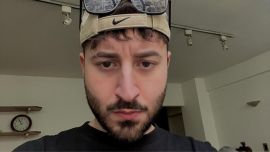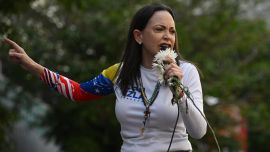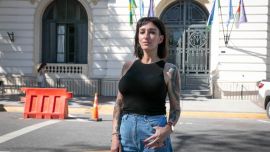The nation’s highest court will have its first Jewish president as from next month, after Ricardo Lorenzetti announced his resignation this week.
A direct nominee of President Mauricio Macri, who was confirmed as a Supreme Court justice just over two years ago, Carlos Rosenkrantz was chosen to head Argentina’s Supreme Court on Tuesday, bringing Chief Justice Lorenzetti’s 11 years leading the nation’s highest court to an abrupt end as from next month.
As Argentina’s first justice of Jewish origin, Rosenkrantz now sets a new first heading the Supreme Court.
In the very first days of his presidency Macri tried to rush Rosencrantz (alongside Peronist Horacio Rosatti, to represent both sides of the political spectrum) into the Supreme Court via an emergency decree, but this back-door entry sparked immediate controversy. Macri was eventually forced to backtrack while publicly acknowledging his error and Rosencrantz had to undergo the normal institutional process of nomination and Senate confirmation, completed eight months later in August, 2016.
CRITICISM
The next year Rosencrantz again ran into controversy when he voted in favour of extending the so-called “two-forone” ruling (in this case, two days off the final sentence for every day of pre-trial detention beyond two years) to crimes against human rights.
That ruling (described as “the most regressive in the last 15 years”) prompted an immediate warning this week from human rights groups including the Grandmothers of Plaza de Mayo, who said in a statement that Rosenkrantz’s rise to the top was a reason for “alarm,” placing memory, truth and justice at risk, although that was not their only cause for concern.
“Rosenkrantz was also the ideologue behind the ‘Fontevecchia’ ruling whereby the Supreme Court disavowed the obligatory nature of Inter-American Human Rights Court (CIDH in its Spanish acronym) decisions,” the Grandmothers communiqué added.
Various emblematic human rights cases such as the Trelew massacre (1972) and the acquittal of Jujuy tycoon Carlos Pedro Blaquier await the Court, the communiqué continued, and here the chief justice is vital when it comes to defining the priorities.
Rosencrantz’s “lack of commitment to the defence of human rights and the National Constitution (due to his acquiescence in nomination by decree)” has already been demonstrated, the NGO said, detailing why the Grandmothers impugned his candidacy in 2015-2016.
Alberto Fernández (Cabinet chief from 2003 to 2008 under both Kirchner presidencies) questioned the choice of Rosenkrantz as Supreme Court Chief Justice, saying the move would consolidate Macri’s grip on the judicial system.
“While preaching the need for independent justice, Macri has quietly consolidated a justice absolutely linked to the government. Bit by bit, he went placing judges in different federal courts until he could build up a new doctrine, a new logic which has nothing to do with legal criteria but is absolutely political,” Fernández told Radio 10.
“Macri does not measure the consequences but as a result the biggest risk we Argentines face is a jurisprudence which begins to be very worrying. Justice is being consolidated as a political tool for the persecution of the opposition and to seek impunity in the future,” concluded Fernández.
BACKGROUND
Rosenkrantz, 59, is a graduate of the University of Buenos Aires (UBA) Law Faculty with a doctorate from Yale University. However, his previous career was more academic than legal – before joining the Supreme Court, he was the Dean of San Andrés University and had previously taught at New York University, Richmond School of Law at Denver University, the Universitat Pompeu Fabra in Spain, and at the UBA.
In political terms Ro - senkrantz is identified with the Radicals (UCR), passing his formative years during the Raúl Alfonsín presidency. In 1984, at the age of 25, he was an adviser on the Consolidation of Democracy Council, created by Alfonsín and headed by the late philosopher and constitutional expert Carlos Nino whose disciple he is considered by some to be.
In 1991, Rosenkrantz represented the Argentine Homosexual Community (CHA) in a case against the InspectorGeneral’s Office (IGJ) for discrimination.
The new head of the Supreme Court is a partner in the firm Bouzat, Rosenkrantz & Asociados, whose clients have included the country’s largest media conglomerate, the Clarín Group. Depending on the progress of the “notebooks” graft scandal, other corporate clients during his career could expose the future Supreme Court president to controversy, judicial experts warned this week.
Justice Elena Highton de Nolasco (who has stayed on in her post beyond the mandatory retirement age of 75) will second Rosenkrantz. His term will expire in 2021.
CELEBRATION
Perhaps not surprisingly, the strongest reaction to Lorenzetti’s exit (and the biggest amount of celebration) came from Civic Coalition deputy Elisa Carrió, who throughout the last decade has accused Lorenzetti of corruption at various levels (and even went one further to imply an indirect link with the death of journalist-politician Débora Pérez Volpin while under surgery last February).
“We won, corruption in the Court is at an end – it’s marvellous,” she told Clarín after the news became public. According to her entourage, she found it difficult to believe the good news (in her eyes at least) of Lorenzetti’s exit.
“Thank God it happened. I’ve been denouncing him for 10 years but now the impunity and the extortion is over. It’s a miracle,” she later told a number of television microphones.
She also communicated a “God bless you!” to Highton de Nolasco, who had formed part of the four-to-one majority voting Lorenzetti out.
The only justice to vote for Lorenzetti’s continuation was Juan Carlos Maqueda. In a four-hour session Rosenkrantz, Highton, Rosatti and Lorenzetti himself all voted for a Rosencrantz-Highton helm (although the first two only voted for the other half since, according to convention, they could not vote for themselves, the reason for Lorenzetti’s vote.)
Speaking yesterday, Justice Minister Germán Garavano said the government “recognised the work” Lorenzetti did presiding over the court, calling it “a very relevant presidency with many high points.”
However, the minister acknowledged that not all the members of the government shared that opinion.
“(Elisa) Carrió does not think the same, but that also has to do with the different views held within the government, which I think enriches it,” he said.
Indeed, the Civic Coalition shows no sign of stopping her feud with Lorenzetti.
Two days after the news of his departure had broken, deputy Carrió presented a new complaint about the judge before the lower house.
This one seeks to extend an existing request asking that impeachment proceedings be opened against the judge for poor performance and possible crimes in the recruitment of judicial staff.


























Comments